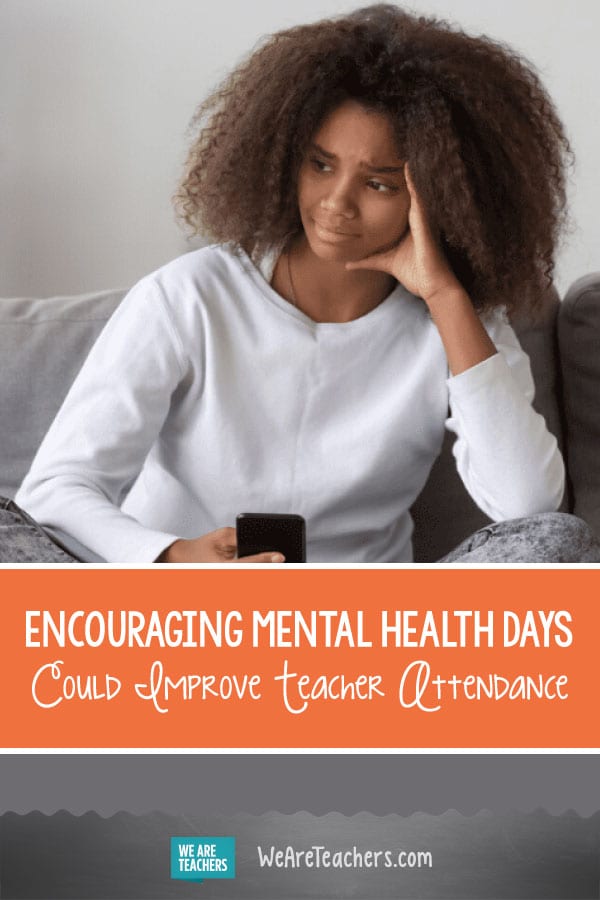Nearly 30% of teachers are absent for more than 10 days every year. This poses huge issues in a working environment where positions must be filled at all times. The principals in our Principal Life group, who, like you, must locate substitute teachers and manage behavioral issues that balloon when predictable school days are compromised, agree. Why is this happening, how can we reduce that percentage, and how can we go about promoting teacher attendance? The solution might surprise you.
Could encouraging teachers to take mental health days actually promote attendance?
There’s little argument that teachers with a mental illness like depression are entitled to days off to care for their health. Similarly, teachers who have experienced emotional turmoil like a death in the family are granted days off to grieve.
The gray area emerges when teachers use sick days to deal with burnout or as a way to practice self-care. This is where we want to make sure our teachers know that they don’t need to share the reasons they take a day off. As adults, they should be trusted to take the time they need to return as the best version of themselves. District policies may differ, but ultimately, when a principal tells teachers they are trusted to do whatever is necessary, it matters.
Tia Doyle is the superintendent of the elementary district in Flint, Michigan. She has incorporated this policy and does not ask for a reason when teachers take a day off.
It’s important for teachers to take care of themselves so they are the best version they can be when they’re back in front of kids.
When the need for, and value of, self-care is seen as something a principal respects, teachers stop being secretive and start feeling good about coming to a school where their personal well-being is valued.
We also need to examine our schools’ burnout culture.
Teachers who are more supported in their day-to-day are less likely to experience burnout. So, try to get ahead of the problem. Kami Tomberlain, a high school principal in California, actively works to encourage the well-being of teachers in her school. She provides free time during the day, teaches mindfulness techniques, and creates a culture of open communication about mental health.
In Tomberlain’s district, teachers get 10 days off per year, seven of which are for personal use. She tells staff to use those days for self-care.
I encourage teachers to take what they need for both physical and mental health.
Karen Finklestein, a middle school teacher in Florida, says that allowing teachers to take mental health days is a way to make them feel respected and seen at work. That pays off in unexpected ways, she adds.
Anyone who feels appreciated will have higher job satisfaction and therefore will take fewer days off.
Allowing mental health days isn’t just about boosting morale, but also about preventative health. Teachers who take a day off to avoid burnout are less likely to reach a mental health crisis that could mean more time outside the classroom, Finklestein says.
Teachers need to take time when they think they need it.
Kela Small, an elementary school principal in Memphis, Tennessee, has gone as far as helping teachers book a day off for mental health. With mental health day (and proper care like counseling, which Small also encourages) her staff of mostly young teachers are better able to meet the needs of students.
They are more present when they are here, when I tell them to take care of themselves.
[contextly_auto_sidebar]
Paying attention to patterns in teacher attendance may be more helpful in the long run.
An occasional mental health day is unlikely to create an issue. In fact, some research has pointed toward increased productivity from days off.
Problems emerge when someone is frequently taking mental health days. If you have an employee who takes too many days off, ask them the reasons and explain the policy on mental health days. Address any underlying issues that come up during your conversation.
Tangi Waldrop, a high school principal in Illinois, encourages teachers to use days off, but keeps an eye out for problematic patterns.
Sick days are for physical and mental health, as far as I am concerned. If teachers are chronically absent, I deal with that on an individual basis.
It’s important to prioritize your own mental health as a principal, too.
Like teaching, being an administrator can be draining. It’s important that you take care of your own mental health. This will benefit you, while also modeling for your staff that it’s ok to prioritize their mental and physical well-being.
Karen Stegman, an elementary school principal in California, takes mental health days occasionally, and encourages her staff to do the same.
If teachers or administrators don’t practice self care, they’ll end up getting physically ill.
The idea of taking a day off for mental health is still new. It’s understandable that it takes some adjustment. Remember that mental health is just as important as physical health. Allowing teachers days off to tend to their mental health just might give you a healthier school community overall.
What are your thoughts on mental health days as a way of promoting teacher attendance? Share your strategies on the Principal Life group on Facebook.
Plus, 7 Inexpensive Self-Care Ideas to Beat the Fourth-Quarter Struggle.


